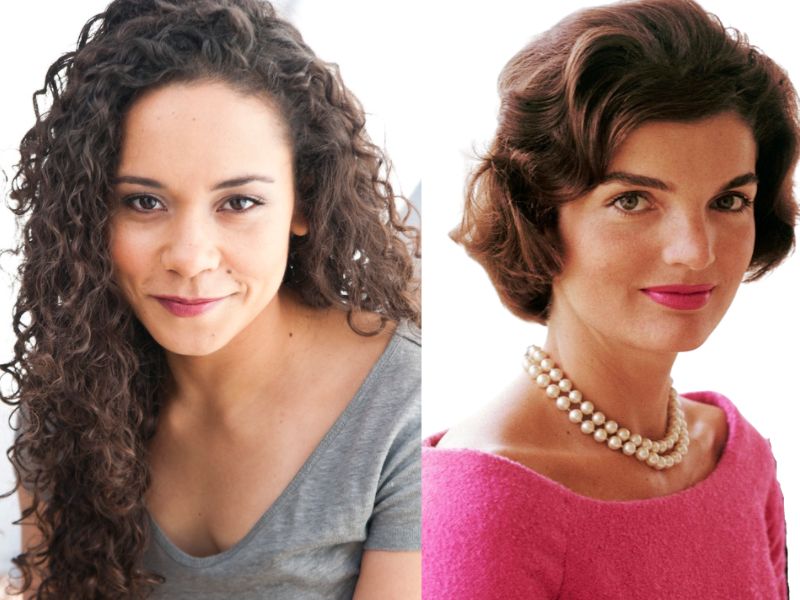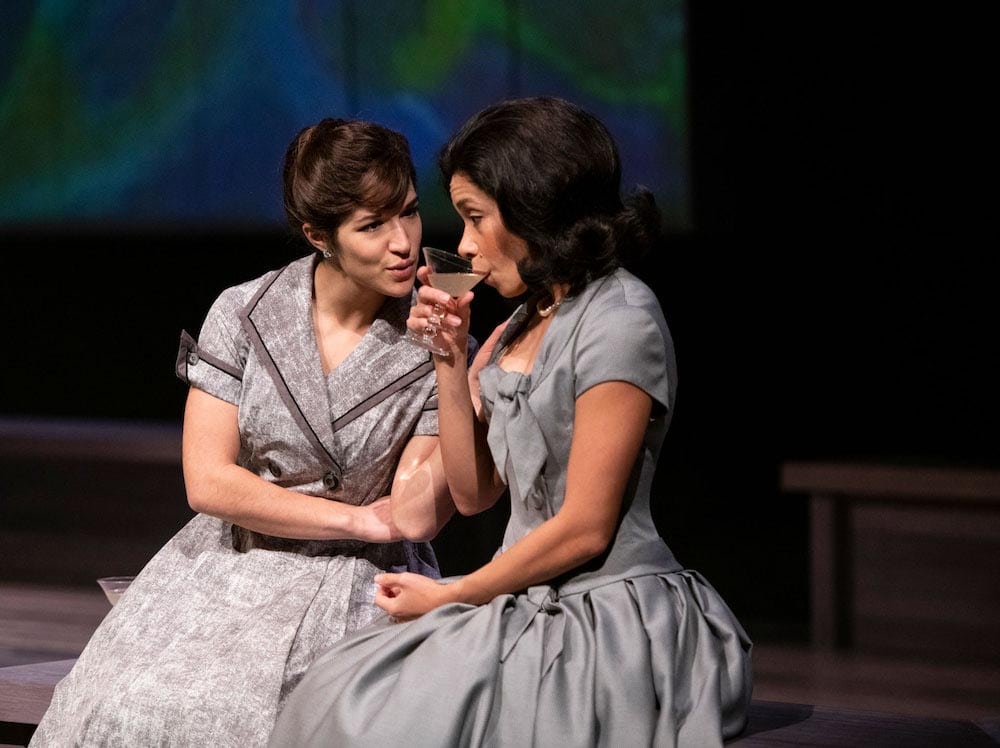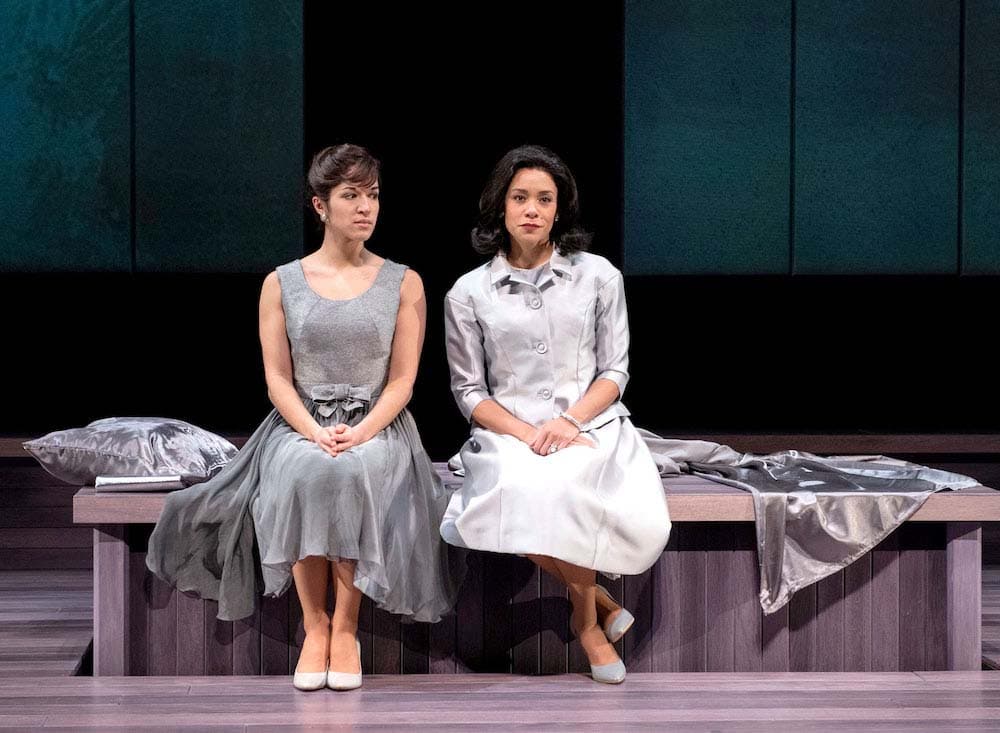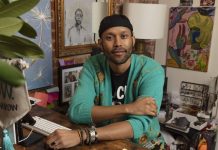Who was Jackie Kennedy? Despite the enormous amount of information we now have about this beautiful, cultured, and tragic First Lady, she remains a national fascination.
Kathryn Tkel’s amazing performance as Jackie is a highlight of Arena Stage’s acclaimed drama Change Agent, written and directed by Craig Lucas. I had an opportunity to talk with Kathryn at length about the person she plays and her process. In this edited transcript of our extraordinary in-depth conversation, Kathryn — who was not even born when Jackie was First Lady — sheds new light on Jackie’s legacy and what she meant to America.

Sophia: Besides being an international icon and a famous First Lady, Jackie was a real person. How did you prepare to play her?
Kathryn: First of all, I never thought I would ever play someone like Jackie Kennedy. So when all this landed in my lap last year during the casting process, it was really exciting.
My first thought was, of course, This is such a beloved, powerful, significant figure in our American history. So I felt that the weight of that.
I had an image of her in my mind. When I was growing up, I first heard of her as Jackie O, and before that she was Jackie Kennedy, and before that Jackie Bouvier. That to me as an actor is very thrilling.
It’s first learning about the facts. You have the responsibility to learn all you can about them as a real person, and then as the particular character in the play — because this isn’t a story just about Jackie. She is a supporting character written by Craig Lucas to facilitate the journey of Mary Meyer [the titular change agent whose affair with JFK purportedly influenced presidential policy]. We all have opinions about Jackie, but it’s my job as the actor who is playing her, in the rehearsal room and in the performance, to imagine and to make a choice as to what the fictional character is believing about herself in this moment. Which is the fun of the play.
There is a lot of historical stuff in Change Agent, but as Jackie, as the actor, it is a lot of private conversations. You have to make sure your brain is not only on this exciting history lesson; you also have to stay on task as to the story we are trying to tell.
There’s more stuff to pull from when it’s a real person of course. And Jackie is a figure we have access to, from interviews and recordings. Even I knew how she sounded before I took on the role.
You sounded a lot like her. She had that soft, low voice. It was cultivated, but it was beautiful.
Yes, it’s intoxicating. I enjoy mimicry and I enjoy impressions, but you can’t just impersonate someone. I needed to find a sound that captures her essence and transports us to a version of Jackie.
One thing you learn as an actor is that we all cultivate our voices. We speak differently at a board meeting, for example, than we would at home with our friends. Or at a barbecue, or in an interview. We put a lot into how we sound.
Jackie lived in an era when there were elocution lessons, and especially if you were a woman you were expected to think about how you sounded and how it made people feel. For women in her social circle, you were expected to speak properly and well.
Why do you think in the play she opens up so quickly to Mary? Because Jackie was a very private person.
That was one of my first questions for Craig. And what we came to discover together was that Jackie is maybe always the smartest person in the room. So educated, so aware, but also coming from her own background: A child of divorce. Having money, losing money, status changes, at a time when that was not a regular thing. That was a thing you had to overcome. She had to learn about her place in the world, and I think she was always reconciling things and learning and surviving.
What we learn about her when she opens up to Mary is that she knows who Jack is. She knows that he sleeps around. She knows that there is this element of his personality that maybe is not ideal for her. In a perfect world, your husband loves you and is devoted to you. But if that’s not the case, maybe there is a way of adjusting.
In our play, and in real life, Jackie would already have known about the women he spends his time with. But because Mary has this relationship with Jack — they have been friends for a long time and haven’t slept together — Jackie might have thought: this is a woman who is singular in his life, that he is treating differently from other women, that he is listening to, that he is friends with, that he has a care for, and there must be something in her that he is drawn to. So the answer that we went with was, there must be something about Mary that makes her different, that allows Jackie to feel like she can open up to her.
And Jackie tests her very quickly. She says to Mary, “You’ve never slept with Jack,” which is truthful and very funny. And then she says, “That puts you in a club of one.”
Jackie asks Mary to ask Jack to stop sleeping around after the nomination, so she must believe that Mary has quite a lot of power over Jack.
I think Jackie is also very aware of her own power — what she can risk and when and why. So she wants to get to know this person. She also wants a best friend who lives next door. Jackie is famously private because she has to be, but that doesn’t mean she doesn’t also desperately want a confidante she can talk to. She is losing children, her husband is sleeping around. There is stuff you might want to unpack with another person — and if this woman is who Jack says she is, an honorable, upstanding, worthy sort of friend, Jackie might want to find that out for herself. And I think she does.
You could have done a story about territory and power over your husband and competition between women, but that wasn’t what Craig was interested in exploring, nor was I.
How were these women exerting their own influence, and how were they surviving? They want to choose love. At a later time, they might choose something different. And remember this is a private, secluded conversation in a backyard. You can see in a lot of Jackie’s interviews there is a fun-loving, dynamic person who is very aware of who she is talking to and what she is doing. I would love to be at a backyard barbecue with Jackie when she is relaxed.
Jackie was a journalist too, and then she became famous for icing them out. She was such a contradiction.
She was, and she had to be. There’s a wonderful interview she does with the press right after Jack gets the nomination. She is joking with them and she is dazzling. They ask if she is going to greet him at the plane whenever he gets back, and she says, “It depends on how many of you will be there.” They all laugh. And they ask, “What were your first words when he called you?” And she answers, “Hello, how are you?” She totally gets what everybody is doing, and she’ll play ball.
It’s a thrill ride to be able to play her, and to be able to talk about her like this.
I don’t want to give it away, but Jackie’s entrance is just extraordinary.
The story is between Mary and Jack, but we know Jackie is coming. And when she enters I felt the emotional weight that Jackie really represents to this country.
I watched the funeral footage. It had such an impact. She planned everything The procession, her widow’s weeds, the riderless horse, the details, her knowledge of what ceremony means, what royalty means. We didn’t really have that in the country at that time, in that way, but the country wanted it. They needed a place to put their grief, and she gave that to them.

There are some things you can learn from a play, from a creative person, about who a real person was. For instance, the play portrays Jackie’s friendship with Mary, but Mary did have an affair with Jackie’s husband for two years That’s a long time. That’s not a fling. Jackie finds out in the play. It must have been upsetting.
Maybe it’s because I’m an actor, but I think people wear a lot of hats. We decide how we are going to survive sometimes. But it doesn’t mean you are not just as destroyed privately. She was able to lean into what was happening in her life, and to be a realist about it doesn’t mean it’s not heartbreaking. Human beings are just so complicated. And that’s one of the joys of being an actor. When you get handed a part you have to hold that person without judgment. You climb inside their skin and their mind and think about all the things that could be affecting how they are behaving. And you do your best to care for them and honor them while you’ve got them.
Do you think she loved him?
I think she did love him. She makes jokes about the club of one. She’s telling us in a humorous way that she does know exactly what’s going on. But I wouldn’t want people to think that she wasn’t hurt or that she didn’t love him because I think she really did.
What must it be like if you’re one of the most admired couples in the world and your husband is assassinated right next to you? How could anyone understand what that woman went through?
I was aware of the iconic pink suit and the basic Dallas framework, but I had not until this play digested what it must have been like to be riding next to the man you love, the father of your children, and have him shot. The trauma, the PTSD she experienced — it’s horrific to a magnitude that is unimaginable to me.
I think that she did deeply love him. She had great respect for him despite all the extramarital affairs. It was difficult and she may have wanted to leave at times. But above all, she understood who he was and who she was as his wife and what they meant to the country and their duty. After his death, she had such care for his image, and their image, and what it meant to the history of the country and its people.
In the play, Jackie says to Mary, “We have both lost.” What does that mean?
The word she doesn’t say is “children.” What she wants to say to Mary is, Jack has to stop the cheating. We’re going to lose it all. He can’t keep doing it.
Jackie has already lost two children and is currently pregnant. And Mary has lost a child too. But she stops because she realizes that they have lost a child in different ways. It’s not the same. She’s trying to show respect for Mary. But she wants to suggest, I think, that we do what we have to do to protect our children.
She’s saying to Mary, We’re mothers, we want to protect our family.
For Jackie’s generation, there was more of a stigma to divorce. And especially in her world, there was that pressure to be with a powerful man.
Secure your social standing, your money, your children’s future. It was a very different time. We need to remember that survival and marriage was a very different ball game then for a woman like Jackie.
So she’s reaching out to Mary…
And in this play, we have to treat the things she says to Mary as truthful. She tries to get out a lot of things early in the conversation. Because she needs a friend.
So many people around her betrayed her. And she was very stoic. A very strong individual.
Yes. Stoic. Strong. I don’t think I would handle that job well. I just know that I wouldn’t. I feel very happy that in this play Jackie has a drink with someone like Mary who seems to be warm and lovely and who is coming at her very honestly.

If you think of Jack as an addict, Jackie is kind of enabling him. On the other hand, she didn’t really have a lot of choices. And Mary does try to make a real connection, to not enable by telling Jack what she thinks. But she is having an affair with a married man. Where does she get to have the high moral ground there?
There is some discussion between Jackie and Mary about fidelity and we learn that each woman has her own moral code. They are also in different positions. You could argue that Jackie is enabling him and you could also say that she needed to make a life for herself and her survival is tied to Jack. Mary’s isn’t. That maybe affords her a different freedom when she deals with him.
You can never know what is going on in a relationship from the outside. And women aren’t stupid. When people say, Why didn’t she leave, there is usually a good reason.
A number of good reasons!
This is part of the fascination of Jackie. She was so good at keeping up the façade. She was brilliant at it. And at the end, Jackie becomes a sort of figure and starts talking about issues of today, like voter suppression. How does that resonate for you?
I like to think that even in the afterlife, when we join everybody on the Arena stage, Jackie continues to refine all of her beliefs and her thoughts. And there’s nothing wrong with saying, as you get older, Maybe decisions I made when I was 30 or 20 weren’t as good as I thought.
Jackie was doing her best to survive with the information she had. I’m sure the information continued to change, and she continued to evolve. I think that’s the hope Craig wants to have at the end. It’s not that it doesn’t matter what you did, but we are all capable of change and growth.
Is there anything I haven’t asked about that you would like to discuss?
It feels very lucky and exciting to be doing such an ambitious play in this climate at this time in our history. But making theater in a COVID world is a lot. It is a lot of work for all the artists. Not just the actors. Plays having to postpone, work might go away at any moment.
It’s lucky we can do this. But we also need it. We need stories that can give us multiple narratives and different perspectives. We need this as a culture. We can’t dial in to make theater. It is a communion. We need more stories, more diversity of stories, bodies, minds.
Change Agent plays through March 6, 2022, in the Kogold Cradle at Arena Stage at the Mead Center for American Theater, 1101 6th Street SW, Washington DC. Purchase tickets ($40–$95) online, by phone at 202-488-3300, or at the Sales Office at 1101 Sixth
Street SW, DC. The Sales Office is open Tuesday – Sunday, 12:00-8:00 p.m. for phone purchases and beginning 90 minutes prior to each performance until curtain for in-person purchases. For information on savings programs such as pay-your-age tickets, student discounts, Southwest Nights, and hero’s discounts, visit arenastage.org/tickets/savings-programs.
Running Time: Two hours 20 minutes, including one intermission.
COVID Safety: Proof of vaccination and photo identification must be shown to enter the building and masks must be worn inside. Arena Stage’s complete COVID safety policies and protocols are here.
SEE ALSO:
‘Change Agent’ at Arena asks if a JFK mistress made history (review by Bob Ashby)




